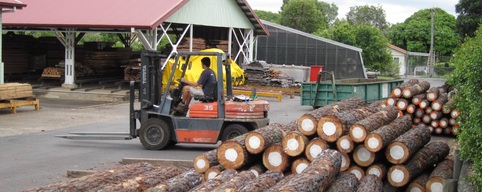

The Polish timber industry, a key sector of the economy, faced a serious challenge with the introduction of a moratorium on logging. This decision, although motivated by concern for the environment, brought with it a number of difficulties for woodworking entrepreneurs. One in four small or medium-sized companies in this sector disappeared from the market, which directly translated into job losses. In regions dependent on the timber industry, such as Podkarpacie or Lubelszczyzna, these effects are particularly severe.
The decision to temporarily ban logging was intended to protect the environment and promote sustainable development. However, this ecological intervention in forest management had a negative impact on local businesses. Wood processing companies found themselves in a difficult financial situation, which led to a wave of bankruptcies. The lack of access to raw materials meant that many of them had to reduce their workforce, and some had to close down completely.
These difficulties particularly affected family businesses and small and medium-sized enterprises that did not have the resources to cope with the sharp rise in timber prices. For many of them, the moratorium meant having to change their business profile or look for alternative sources of raw materials, which was not always possible.
The lack of locally sourced timber also led to price increases for products on the domestic market. These increases were partly passed on to consumers, but the financial burden was felt most by companies that had to compete with cheaper foreign counterparts.
Polish furniture, which has been valued for years for its quality and design, is starting to lose its competitive edge to products imported from China and Vietnam. Although the domestic furniture industry has always been able to successfully compete on the global market, the limited availability of wood has caused production costs to rise, thus reducing the profitability of exports.
Low production prices in Asian countries are putting even more pressure on Polish companies, which have to balance the need to maintain high quality with a limited budget. As a result, consumers are increasingly choosing cheaper options, not always valued for their durability or design, which translates into a further reduction in the share of Polish furniture in global markets.
While temporary fluctuations in the industry may be a normal part of the market game, the current situation could permanently affect the reputation of the Polish furniture industry as a quality leader. Companies are starting to appeal for government support to stabilize the situation and rebuild their position in the market.
In the face of these challenges, industry leaders have appealed to the government to increase the availability of wood and lower the prices of the raw material. The government's understanding of the needs of the timber sector would be an important step towards protecting the Polish economy from further losses.
The government, recognizing the challenges posed by the timber industry, is working on updating the National Energy and Climate Plan (NECP). The aim of these measures is to adapt Polish policy to EU climate requirements, ensuring sustainable development, but not at the expense of local businesses.
The Ministry of Climate and Environment emphasizes that it is important to reconcile environmental protection with the needs of industry. It is imperative to introduce solutions that will increase the availability of wood raw materials while at the same time allowing for the effective protection of forest resources. This approach would not only protect Polish forests but also support the wood industry, which has been contributing to the country's economic growth for years.
Otherwise, there is a real threat to the condition of the entire timber industry. In the face of an unstable market situation, a reduction in timber harvesting could further jeopardize its future. Policymakers must therefore carefully weigh the long-term economic impact of policies to avoid exposing the Polish economy to further losses.



